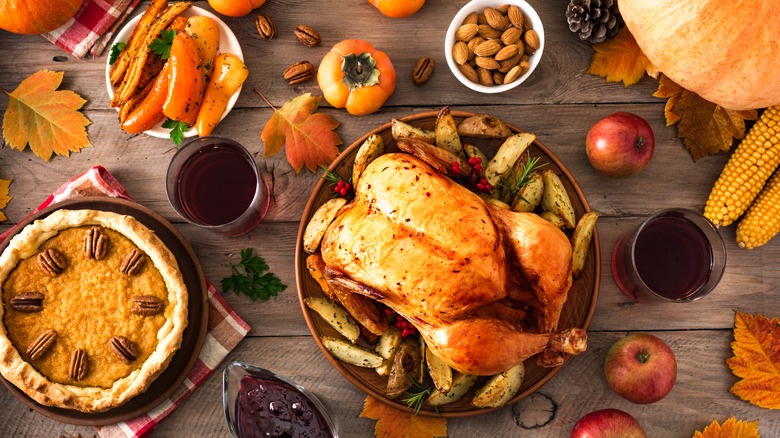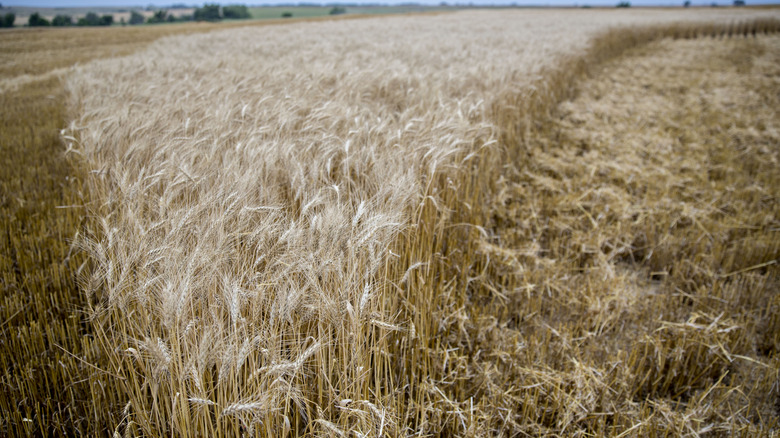Why There Might Not Be Apple Pie At Thanksgiving This Year
Some of us just aren't cut out to be bakers and cooks. And that's fine because for as long as we can remember, there have been supermarket pie options that we've been able to fall back on. But what if supplies of our favorite commercial fruit pies are now being threatened by factors beyond our control?
While more people are buying Thanksgiving goodies so they can celebrate IRL, they're also discovering that there are fewer turkeys, pies, and pre-made gravy to be found in groceries this year. This drop in inventory isn't expected to hurt shoppers who have already bought their food supplies for the holiday — but it will affect those who wait until the last minute to get their goodies, per Entrepreneur.
Those who have shopped early may have found prices to be much higher than they might have remembered from Thanksgiving days past. A survey by the American Farm Bureau shows turkey prices are up by 24%, two frozen pie crusts are 20% more expensive, and a dozen dinner rolls are 15% pricier than they were last year. If we were to consider 2020 as an anomaly because of the pandemic and compare to prices from two years ago, turkeys are 13% more expensive, as are ham (8.7% more), as well as canned fruits and vegetables (8.3% more) and gravy (6.7% more), per Business Insider.
Supply chain problems are fuelling price hikes
Some of these price hikes are being driven by a supply crunch; bakers and other food suppliers are slashing orders because they just can't meet them. One example is Mike's Pies, a commercial Florida bakery that has already warned The Washington Post that there will be fewer of their favorite pies this season. "We are cutting every order that we ship; we can't fulfill the obligations," Mike Martin said.
Part of this has been triggered by a staffing problem. "The labor supply is a challenge. The number of pounds we can produce is directly related to how many people we can employ and how many show up on a given day," Martin said.
In case you're wondering whether prices will continue to skyrocket, Treasury Secretary Janet Yellen has said that inflation should slow down by next year. "I expect that next year, many of the supply bottlenecks that we're experiencing now in opening up our economy will recede. Sometime during the second half of the year, we'll see inflation rates moving back toward the 2% that we regard as normal," she told NPR. That's the consensus The Washington Post has heard from other economists, too.
Bad weather has hurt production
The Washington Post is also warning that beyond a labor shortage is a raw materials shortage that's been triggered by bad weather conditions. Commodities analyst Kyle Holland says drought conditions have either killed off or hurt wheat crops in important wheat-growing regions so that totals are at their worst since 2002. That observation is echoed by Janis Abbingsole, vice president of operations for flour manufacturer King Arthur Flour. She said to the Post: "Every consumer package goods company is feeling it — no matter what their business is. The pressure on the hard red spring wheat is a result of weather and drought conditions. Mother Nature bats last."
Supply shortages triggered by problematic weather also prompted Wells Fargo's chief agricultural economist Michael Swanson to warn the Post, "There is no place to run and hide from extreme weather events."
Those of us who haven't really given much thought to climate change might find that the years ahead will bring more uncertainty and price hikes that aren't linked to the coronavirus pandemic.


